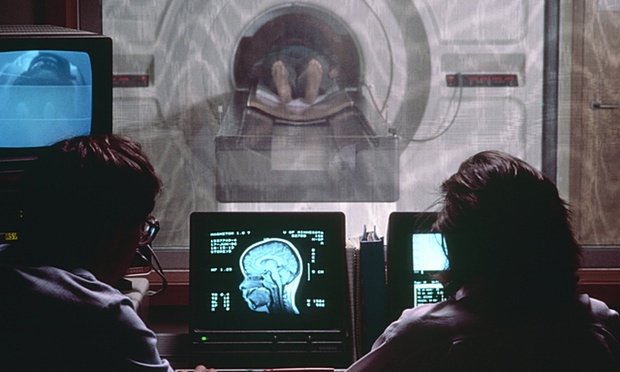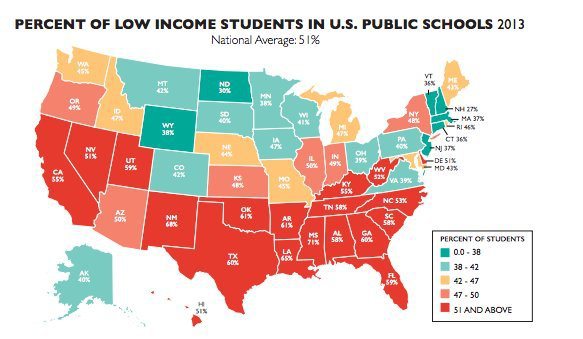
Treating child poverty like a medical condition isn’t so far-fetched. Research has revealed a correlation between lower brain development in children of low income households compared to those of wealthier ones. According to a research paper published in JAMA Pediatrics in September, kids growing up in families under the federal poverty level ($24,000), are at a higher risk or remaining impoverished as adults.
The study focuses on a sample of 400 healthy children, aged between four and twenty-two. MRI scans conducted on those from underprivileged backgrounds, have less gray matter – the brain tissue that processes information. The correlation between those who were more impoverished and had less gray matter, was evident. Those who had more gray matter were from households with higher incomes.
Seth Pollak, psychology professor at the University of Wisconsin–Madison and coauthor of the study, told Bloomberg Business that, “It was really when we started getting down into real poverty, real abject poverty, that we started seeing a difference.”
This worrying trend—more than 20 percent of children are growing up in less than ideal conditions—needs to be offset, according to Pollack, starting with the ready availability of fresh fruit and vegetables at a lower cost, rather than families living off processed foods defunct of nutritional value.
It isn’t to say those growing up in poverty aren’t able to achieve academically, but according to Pollak’s research, the achievement gap could be, to an extent, explained by the lack of gray matter found in the formative years of these children.
In conclusion, according to the researchers, the governments’ have a duty to do more. “The influence of poverty on children’s learning and achievement is mediated by structural brain development. To avoid long-term costs of impaired academic functioning, households below 150% of the federal poverty level should be targeted for additional resources aimed at remediating early childhood environments.”
This Article (Treating Child Poverty like a Medical Condition) is a free and open source. You have permission to republish this article under a Creative Commons license with attribution to the author and AnonHQ.com.






“In conclusion, according to the researchers, the governments’ have a duty to do more.”
Are you kidding me? The child’s parents responsibility is to do more. And that responsibility begins prior to choosing to have a child at all.
Yes, I’m fully aware that women get pregnant by “accident”. Birth control failure for whatever reason or, far more common, willingly having sex while NOT using any form of birth control with full knowledge that you are in no position, financially or emotionally, to capably raise a child.
The government is not the parent of your child. And to assume that it is, is the height of stupidity.
In this day and age of over 50 different forms of birth control, there are few credible reasons to get pregnant if one truly doesn’t WANT to get pregnant.
YOUR child is YOUR responsibility, a responsibility that begins long before that child is even a gleam in your eye.
Like The Strike!
https://www.facebook.com/TheStrike2015
My sister died, I was the only left to take her 3 kids . Is it my fault that sometimes we need help and if so thank you for making me feel like crap for keeping my promise to always keep her kids together.
Clearly LT is a man and one with a very one-dimensional view of the issue.There are many reasons why children end up living in poverty. It’s not just simply that everyone is making irresponsible decisions to have a child they can’t afford. As Cindy above points out, she was left to care for her sister’s 3 kids and being a loving person she accepted that responsibility and now sometimes needs help. And actually one very common scenario (which I have seen firsthand with 2 sisters and several friends) is a married woman who had children “responsibly” and then when her husband decides to divorce her, she and her children end up living in poverty. (It has only been recently that deadbeat dads have been forced (at least to some extent) to meet their court-mandated child support obligation–financial support usually so low as to be laughable).
How much child poverty and its effects could be avoided if divorced fathers were required to pay enough child support to make a difference, instead of paying some token amount and still having enough to start up a second family.
Regardless of any kiddies circumstance … just feed the kids first, strengthen families & communities in whatever way one can even in the smallest act of kindness of giving a tin of food to the food bank … it’s a start. It’s funny how it’s so easy to wave the finger at the Mothers but what if the tables turned & the Mothers decide well why not make the father the main caregiver instead! I know from personal experience that women are stigmatised in either scenario therefore damned if I do damned if I don’t in the non custody or custody pursuit of kids … but I still reckon it’s a lot darn easier to pay child support than having the mother load.